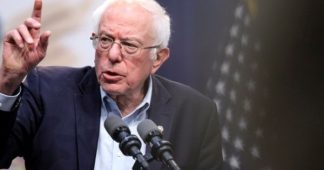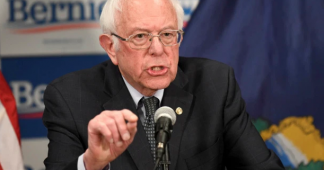The End of Oil? Pandemic Adds to Fossil Fuel Glut, But COVID-19 Relief Money Flows to Oil Industry
Sept.2, 2020
As the coronavirus pandemic contributes to a glut of fossil fuels, groups like Greenpeace are calling on Democratic presidential candidate Joe Biden to ban fossil fuel interests from his campaign and administration, if he wins, even as he recently declared at a campaign stop that he “will not ban fracking.” We discuss the politics of fossil fuels with reporter Antonia Juhasz, who says the end of oil could be near, and look at how the industry has profited from the COVID bailout. “The pandemic has taken essentially every weakness that already existed in the oil industry and then made each of them much, much worse, leaving the oil industry in a situation where I would argue it is at its weakest since its inception,” she says.
Transcript
AMY GOODMAN: Longtime Massachusetts senator and Green New Deal champion Ed Markey won his primary against challenger Congressmember Joe Kennedy III Tuesday, marking a victory for progressives and the first time a Kennedy has lost an election in the state of Massachusetts. Senator Markey secured 54% of the vote in a primary race seen by many as a showdown between the Democratic establishment and its new and growing progressive wing. House Speaker Nancy Pelosi endorsed Kennedy, while Markey had the support of New York Congressmember Alexandria Ocasio-Cortez and the youth-led Sunrise Movement. The Sunrise Movement tweeted in response to the victory, quote, “After winning elections across the country, you think we’re gonna stop now? They wish. We will protest outside the halls of Congress while our allies on the inside negotiate the Green New Deal,” they said.
This comes as Democratic presidential candidate Joe Biden said he would not ban fracking during a speech in Pittsburgh. A group of 145 organizations, including Sunrise Movement and Greenpeace, have released a letter calling on Biden to ban fossil fuel interests from his campaign and administration, if he wins. The letter reads, quote, “To advance environmental justice, you must stand up to fossil fuel CEOs, stop the expansion of oil, gas and coal production, and rapidly transition us away from fossil fuels,” unquote.
This comes as the global oil industry is in crisis with falling demand and crashing prices exacerbated by the coronavirus pandemic. Despite this, fossil fuel companies continue to pump out an excess of oil, much of it stored on tankers in the ocean. In May, as 390 million barrels of oil and gas sat in storage on the world’s oceans, Greenpeace activists sailed out along the San Francisco Bay, unfurling a banner saying “Oil Is Over! The Future Is Up to You.”
GREENPEACE ACTIVIST: I’m here in San Francisco Bay, where floating oil storage tankers are now idling, storing oil that no one wants and where we have nowhere to put.
AMY GOODMAN: Despite this, Congress has poured billions of dollars of COVID relief funds into bailing out the fossil fuel industry.
We go now to Boulder, Colorado, where we’re joined by Antonia Juhasz, an oil and energy reporter, a Bertha fellow in investigative journalism. And her recent cover story for Sierra magazine is “The End of Oil Is Near,” along with another report, “Bailout: Billions of Dollars of Federal COVID-19 Relief Money Flow to the Oil Industry.” She’s the author of several books, most recently, Black Tide: The Devastating Impact of the Gulf Oil Spill.
Antonia, welcome back to Democracy Now! Let’s start with the pandemic and this glut of oil. I don’t know if people realize that — some call them armadas of oil tankers, are docked off coasts, everywhere from the United States to Africa to Asia. Explain what the pandemic — how it relates to the oil industry.
ANTONIA JUHASZ: Well, I think the most important place to start — and thanks for having me on this morning — is that the problems that have been plaguing the oil industry, that have led to the glut in oil that we’re experiencing right now, well precede the COVID-19 pandemic, that the pandemic has taken essentially every weakness that already existed in the oil industry and then made each of them much, much worse, leaving the oil industry in a situation where it is right now, where I would argue it is at its weakest since its inception, and, essentially, public policy and public will will now determine the fate of the oil industry, period.
And how we got to this place, where the height of this problem was in June with just oil tankers stacked up — anyone who lived on a coast would have seen pretty much these armadas of oil tankers that were holding oil. How we got to that place was, essentially, years of the oil industry obsessively overproducing a product of shrinking value and shrinking demand. So, starting in 2015, the growth in demand for oil worldwide started to fall, and it fell precipitously from 2017 to 2019. The price of oil was falling, but the companies and the countries just kept producing more and more and more and more, with the United States one of the leading countries.
At the same time, you’ve got movements that are successfully weakening demand, desperately trying to get off this product, increasing the value and accessibility of alternatives, reducing the political payoff for supporting the oil industry, and the economic payoffs just dwindling, the companies falling in profits, falling in share value, investors not wanting to put money backing these companies’ plays, and a worse and worse and worse and worse financial situation for the companies and the countries producing it. But they kept producing, so you have this glut of buildup.
Then comes COVID-19. COVID-19 happens. We’re all in lockdown. Demand for oil products just craters into the ground. And at the same time, the companies and the countries keep producing more oil, which led to an even greater glut, which led to the oil being stored offshore in tankers.
AMY GOODMAN: And yet you have COVID-19 money, with how many tens of millions of people out of work, people desperate for support, small businesses. So much of that COVID money is going to bail out the largest corporations, oil corporations.
ANTONIA JUHASZ: Yeah. So, you had — first you had the Trump administration say, and Trump himself say, “We’re going to design a ballot specifically for the oil and gas industry.” And there was tremendous pushback against that in the public, and Democrats in Congress said, “No, that’s not going to happen.” So, instead, what we ended up getting is three, essentially, stealth mechanisms that have really heavily tried to prop up this industry, that, left without that support, we would see a much greater shrinkage than we’re seeing right now, although we’re already seeing a good deal of shrinkage.
But so, these three mechanisms were, first, in the CARES Act, the Paycheck Protection Program, documented — a research organization did research for me for my Sierra magazine articles, that found 7,000 oil and gas companies receiving as much as $7 billion in Paycheck Protection Program money. Because the oil and gas industry is dominated by white men, globally and nationally — those are the people that own the companies, and in the U.S. a good deal of the workforce is white men — that also contributed to the overall bias of the PPP program towards white male-owned businesses, so they got Paycheck Protection Program money, which has propped up a lot of companies that wouldn’t — certainly wouldn’t have made it on their own.
Then you had tax loopholes snuck into the CARES Act, which Democrats are trying to close in this next version of the CARES Act, that allowed over $3 billion to go to at least 50 publicly traded oil and gas companies, and probably many, many more, because we only know about the publicly traded ones because they have to report it in their reports to the Security Exchange Commission, and private companies don’t have to do that.
But I would say the most problematic pot is this unprecedented move to have the Federal Reserve, for the first time — so, excuse me, the American taxpayer, through the Federal Reserve, for the first time, now become owners in oil company debt. So, the Federal Reserve set up, through BlackRock, several different mechanisms to try to prop up the economy. And through two measures, the oil industry has received inordinate support. And the research group InfluenceMap looked at one of these mechanisms and found that the Federal Reserve’s funding is overweighted in fossil fuels. So, through BlackRock, you and I, the American taxpayer, are now owners in debt, through the Fed, of Exxon, of Chevron, of Energy Transfer Partners, of Phillips 66, of Schlumberger, which is a company that just moved itself out of U.S. fracking altogether, after we bought up their debt.
So we are literally, through the Federal Reserve, propping up the oil industry at a time when, you know, for a huge host of reasons — climate crisis, environmental justice, the lives of people who live next to oil and gas facilities — that we need to allow this industry to do what it would be doing on its own anyway, which is going away, because the world is trying — and succeeding — in moving away from this resource.
And what the Trump administration — and what one of the analysts I spoke with, Alexis Goldstein, who looks at these markets, said, you know, what seems to be clear is that the influence of the Trump administration seems to have been influencing the Federal Reserve, which it shouldn’t be, to overweight this support for the oil and gas industry.
AMY GOODMAN: At the same time, Antonia, you have ExxonMobil dropping — was dropped from the Dow Jones Industrial Average after 92 years, overtaken by tech companies. BP has announced they’ll cut oil and natural gas production by 40% in a decade. What do these things indicate?
ANTONIA JUHASZ: So, you know, this ExxonMobil was one of the founding companies within the Dow Jones Industrial Average in its earlier incarnation, Standard Oil of New Jersey, which means, essentially, the Standard Oil Company, the original oil and gas company, which then became Exxon and Mobil — and its different pieces are all of the major oil companies — BP is a former piece of the Standard Oil Company — that ExxonMobil, its largest piece, is now — its stock is so weak that it’s essentially irrelevant to the U.S. economy, is what that is saying. Its stock is that weak.
And that is a clear indication that all of the work that has gone into exposing the harms of the oil industry, working to get banks and investors to shift their money away from it, to shift political power — to shift the political power that this industry operates and to move away from its products, is succeeding.
And BP’s announcement that it is going to, in 10 years, reduce oil production by 40% is significant. It’s a clear indication of the weakness of this product. But it’s also a reflection of a couple other important things. The first is that there’s different reporting requirements on companies in Europe. So, BP and Shell are responsible for telling the public what they expect to see in the future for the price of oil and for the value of their product. And when they had to report in this last quarter that they see no value, essentially, or very much reduced value for their product moving forward, they had to account for those losses, which, in the case of BP and Shell, was $22 billion for Shell in losses and nearly $17 billion in losses for BP. And then they had to tell the public: So, how are you going to make a profit, given that oil — you know, so much oil is essentially going to be worth less? And they said, “OK, guess we’ll figure out how to make a profit doing something else.”
U.S. companies don’t have to do that. So Exxon and Shell didn’t — Exxon and Chevron didn’t have to report those same type of losses, and they didn’t have to say how they’re going to make money. And what they said was, “Well, we’re going to keep making it off of oil and natural gas, because that’s what we do.” And what that tells us is that oil is increasingly worth less, and the companies that have to tell us that did. But what it doesn’t tell us is that what we should be doing moving forward is trusting the oil companies to change appropriately to address the problem at hand, because even in 10 years BP is still planning to have over 60% of its operations be from oil and gas. And BP has already started selling off oil and gas assets, but that doesn’t mean it’s keeping that oil in the ground. It just means that it has sold them to other companies, which are already producing them.
So, if we want to live up to the obligations which the United Nations Intergovernmental Panel on Climate Change has told us, that at least some 80% of fossil fuels need to stay in the ground, that’s going have to happen through government policy. And it’s going to have to be government policy that is grounded in equity and justice, so those nations that can go first do and go the fastest, and those communities that are essentially experiencing the majority of the harms of oil extraction without enjoying the benefits also go first and are helped to be transitioned away, while they’re keeping fossil fuels in the ground, and that the world and nations support each other in this process through a national Green New Deal, through a global Green New Deal, through policies that make it clear that we are in this together as we make this difficult transition, but we will do it, and we will do it promptly.
The last thing I would say is —
AMY GOODMAN: Antonia, I wanted to ask you —
ANTONIA JUHASZ: Yeah, yeah.
AMY GOODMAN: — about the group of 145 organizations releasing this letter calling on Democratic presidential candidate Joe Biden to ban fossil fuel interests from his campaign and administration, if he wins. The letter reads, “Nearly half of Americans now breathe polluted air, the vast majority of which comes from burning fossil fuels … To advance environmental justice, you must stand up to fossil fuel CEOs, stop the expansion of oil, gas and coal production, and rapidly transition us away from fossil fuels.” Yet during his speech in Pennsylvania Monday, Joe Biden said he will not ban fracking. This is what he said.
JOE BIDEN: I am not banning fracking. Let me say that again: I am not banning fracking.
AMY GOODMAN: So, if you can respond this? Despite the fact, of course, the Trump administration, you couldn’t get an administration more pro-oil — he attacked Joe Biden recently, talking about him being against oil, gas, guns and God. Can you talk about Biden’s record, and as well as Kamala Harris, his running mate?
ANTONIA JUHASZ: Yeah, absolutely. So, you know, here is a place where Kamala Harris and Joe Biden have put forth diametrically opposed pledges. Kamala Harris pledged to end fracking in her campaign. Joe Biden has now said he won’t. In a play of wills between Kamala Harris and Joe Biden, I’m going to go with Kamala Harris, and I’m also going to go with the public, that, you know, essentially, with Joe Biden, is going to need to continue to push, just as the entire environmental and social justice movements have said that they will.
Biden did go further in this election, and did Kamala Harris, than any other set of candidates that have made it this far. Biden pledged to end fossil fuel subsidies for the industry. Biden and Kamala Harris both took No Fossil Fuel Money pledges, not to accept money from the industry in their campaigns. Harris also pledged no fossil fuel subsidies. Biden and Harris also both pledged no new leasing on public lands for oil and gas, and offshore for oil and gas. Those are all critically important fossil fuel policies, and they’re Keep It in the Ground policies. And then Kamala Harris went further. She pledged to pursue a global negotiation for the managed decline of fossil fuel production around the world. I can’t overemphasize what a shift that would be, how important that would be.
And so, moving forward, during the campaign and after the campaign, a Biden administration is going to need to continue to hear loudly from the public on what it wants, not just on addressing the climate crisis, but addressing fossil fuels in order to succeed at addressing the climate crisis. And I think Kamala Harris is going to be the stronger ally in that to keep that pressure on Biden and on the Biden administration, and during the campaign, as groups are now.
AMY GOODMAN: Very quickly — we only have a minute to go — I wanted to ask you two questions. One, the significance of the primary win of Senator Markey in Massachusetts? And, two, the issue of how this bailout should be rolling forward: What should be bailed out, and what should be allowed to die?
ANTONIA JUHASZ: The Markey win is essentially a victory across the board, for the Green New Deal, for confronting the climate crisis, for progressive politics. You know, Markey has been out front on so many of these issues. When I was writing on the BP Deepwater Horizon disaster, his work was so key in exposing not just BP’s operations, but the federal government. He would consistently hold the Obama administration to account on its failures on the BP crisis. So his victory is tremendous in moving forward with the Green New Deal.
And how the bailout money should be spent — first of all, just to make sure we’re clear on what’s moving forward right now, the Trump administration’s unemployment plan that he’s put into place is coming out of hurricane — federal hurricane recovery money. So, that shouldn’t be happening. What we should be doing is moving into a direction that’s actually going to support workers moving forward, that’s actually going to support our economy and actually support rebuilding. And that’s not doubling down on an industry that is failing. That’s looking forward to localized, small-scale building up of the green, renewable, sustainable, equitably owned and distributed energy and transportation solutions. And those policies have been proven time and time again by economists now who have looked back since 2008 on what’s worked for recovering after huge economic catastrophes, and green economy, green jobs trump fossil fuels by four to one.
AMY GOODMAN: Antonia Juhasz, I want to thank you for being with us, oil and energy reporter, Bertha fellow in investigative journalism. Her recent cover story for Sierra magazine, we will link to at democracynow.org, “The End of Oil Is Near,” and “Bailout: Billions of Dollars of Federal COVID-19 Relief Money Flow to the Oil Industry.”
Next up, unions representing teachers and principals in New York City avert a strike as they reach a deal to delay the reopening of the largest public school system in the United States. You’ll find out what it is. Stay with us.
[break]
AMY GOODMAN: “Pomp and Pride” by Toots and the Maytals. Get well, Toots. He’s in the hospital right now.











